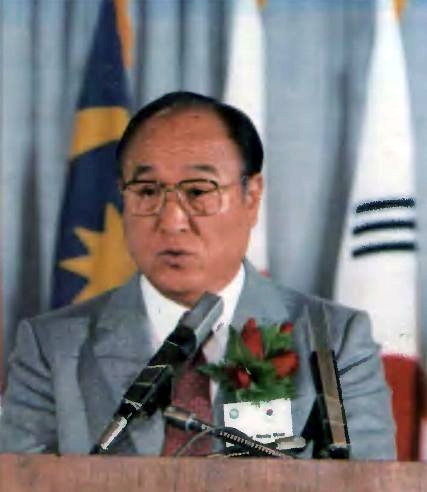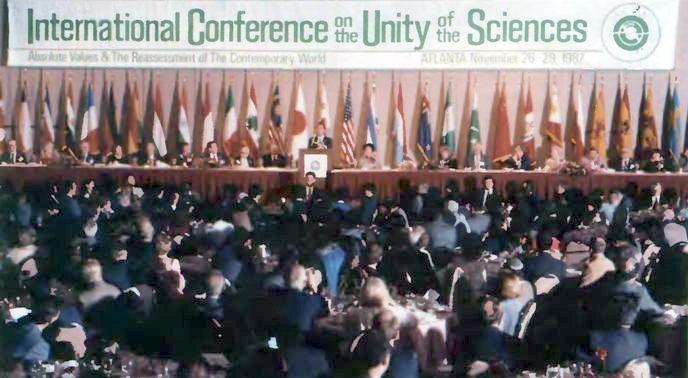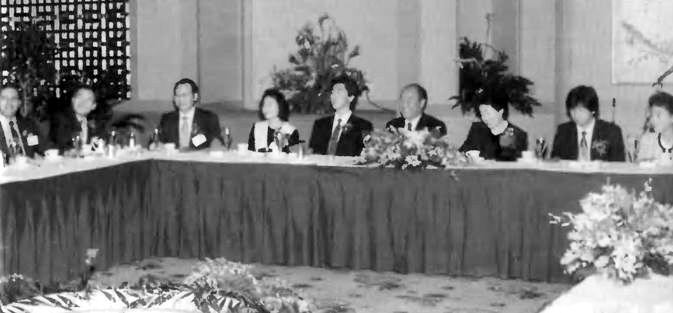![]()
The Words of Sun Myung Moon from 1987
|
|
The Words of Sun Myung Moon from 1987 |

Father
delivers his Founder's Address at the 16th ICUS.
Honorable chairmen, committee chairmen, distinguished professors, ladies and gentlemen: As founder of the International Conference on the Unity of the Sciences, I truly welcome you to ICUS XVI.
This year our theme is Absolute Values and the Reassessment of the Contemporary World. Today it is really necessary that the world be reassessed in every field. I do not know any better group to make such a reassessment than ICUS -- this gathering of distinguished scholars representing all fields of knowledge as well as all cultures, religions, races, and nations. I think that among all academic groups in the world only ICUS is striving fundamentally to discover the true purpose and unity of the sciences. You should know that ICUS, among all gatherings of scholars in today's world, has a historical mission.
The complicated problems of the world cannot be fully understood simply within the narrow perspectives of individual fields of knowledge. Their solution is beyond the capability of any single specialized society of scholars. This is because the problems of the world are essentially the problems of the human being. A human being has both a physical body with material desires and material senses and a spiritual self with spiritual desires and spiritual senses. The world is nothing but an extension of the human being with these two-fold aspects; in other words, the interrelationship of human beings with their two-fold aspects determines the order within societies and among nations. This is the reason why multidisciplinary research for solving the world's problems has to significantly consider such factors as religion, culture, art, and so on.
Reassessment of the contemporary world by ICUS should certainly include a reassessment of the systems of the Eastern and Western blocs and, at the same time, a reassessment of what the role of science in these two blocs has been and how closely these sciences have come to-their ultimate ideal. -Today, regardless of how many excuses the leaders of these two blocs make, nobody can deny that the existing systems and orders in the world have failed to guarantee the true happiness of humankind. They have already hit their limit, and they are going to decline.
In order for ICUS to reassess today's world, there should be a unifying standard and its central point. This central point should relate with the two-fold desires of the physical body and the spiritual self of the human being. I recognize that, in the Middle Ages, God-centered thoughts and religious dogmatism blocked scientific exploration and limited the physical fulfillment of human beings. However, it has been a big mistake for humanistic thinkers since the Age of Enlightenment to hold not only that religious belief is inferior to human reason, but also that humans' spiritual demands are in conflict with human reason. The emphasis that the Enlightenment or humanism put on rationality has been the great driving force for the sciences as they pursued the discovery of rational laws in nature. With reason only, however, we become separated from the ultimate purpose of the human being, who has a two-fold nature. Without this ultimate purpose, the human being cannot stand independently or even discover the right direction. While ignoring spirituality and being satisfied with reason and intellectual accomplishment, people have not been concerned about solving the urgent problems connected with their own ultimate purpose. As a result, they have come to be enthralled under materialism and so have lost their dignity.

The
head table at the Farewell Banquet. Rev. Chung Hwan Kwak, chairman of
the ICF Board of Directors, introduces Father.
Truth is one and is a principle ruling both nature and the human world. This principle in nature is the root and source of all things of the universe. This principle in the human being is the absolute value of love, which guides us to complete our personalities through harmony of our spirituality and physicality and to realize truth, goodness, and beauty.
I do not believe that claims by theism, humanism, and materialism have been until now only in irreconcilable conflict with each other. I rather think that they were partial, immature expressions of (and thus imperfect claims about) the one principle -- that is, absolute values. In order to fundamentally solve the various human problems of the modern world, we should find absolute values, one principle, which can cope with the whole, beyond any existing ideologies and claims.
Absolute values bring us ultimately to the fundamental inquiry about God. To accept that God does exist is to recognize that there exists a universal principle that operates consistently in nature and the human world. On this foundation, values that appear to be relative can be understood as interrelated with each other on the basis of absolute values.
I know that "absolute values" is not a popular theme among scholars today. But I hope, first of all, that scholars do not make the mistake of confusing absolute values and absolutism. I have emphasized several times at ICUS that absolute values are based on God's love. God's love is not sectarian. God's love reaches deep into human hearts and becomes the source of true love gushing out into the everyday lives of human beings. Therefore, God's love is the fundamental element for forming one harmonious heartistic realm embracing all people and comprehending all relative values. Thus, absolute values based on God's love are deeper, broader, and more permanent than values based on rational presuppositions or on relative ideologies or beliefs.
Absolute values are not contradictory to rational thinking, but rather enable the discovery of its ultimate purpose. It is not only because of our reason that we are human beings. Intellectual analysis is defective if it does not fully value emotion, will, and spirituality in human life. Only when led by absolute values based on true love will rational exploration contribute to the true happiness of human beings.

On
Friday night, the conference organizers had a chance to enjoy dinner
with True Parents and the older True Children. Dr. Kenneth Mellanby
addresses True Father.
I urge ICUS to begin a comprehensive reassessment of today's world. Conventional habits of mind and attitudes have not been sufficient to deal with the amassed problems in our world today. Furthermore, the solution of problems that contemporary society faces will not come from the consideration of human factors only. We should also consider that the history of humankind has been proceeding toward the realization of the will of God. Therefore, the contemporary world should be reassessed from viewpoints based on absolute values, which lie beyond nationalism, ideology, or even global viewpoints and which originate from the love of God. As long as today's intelligentsias are ruled by relativistic viewpoints, there can never be unity of the sciences, nor can there be unity and harmony among races, among cultures, or among religions. Courageous pioneers are needed who, for the sake of the absolute values perspective, are willing to run risks and be persecuted bitterly. Difficult and daring decisions are necessary if the many existing partial viewpoints are to be unified into one coherent principle.
Today we should acknowledge that sciences and philosophies have failed in solving the world's problems. The great promise of natural science has too often been used for evil purposes and not for the true happiness of humans. The fields of social science have often been corrupted under the influence of egoistic, sectarian, political powers and so have played a dysfunctional role on many occasions. Philosophy also has given up the great pursuit of the ultimate ideals of human beings, and hence has lost its life. Such a trend is becoming more serious because of the passive attitude of most scholars. I think that scholars should not be satisfied only with the outcome of their research, but should respond to the call of the world, which is in need of active guidance.
The world demands responsible action by scholars who enlist their capabilities for the good of mankind in accordance with a right values perspective. Conscientious intellectuals should protect the fruits of scientific research from being misused. Further, the sciences should not serve only partial relative values, but should be focused on absolute values for the benefit of the universe and the whole of humankind. Scholars should not be passively influenced by political, economic, or social currents, but should play an active role in leading society with wisdom gained through historical insight and with the feeling of mission. The contemporary world, more than ever before, is burdened with problems that can be solved only though cooperation among nations and among races. In international and pluralistic societies, cooperative action by many intellectuals is no less important than individual research in specialized fields.
Among many scholarly conferences of the world, only ICUS has as its theme the ultimate issues of absolute values and the unity of the sciences. There are no more urgent issues than these. Without finding absolute values, the unity of the sciences is not possible. I have entrusted this mission to you. Therefore, I hope that this meeting will lead to a proper reassessment of contemporary societies and to the accomplishment of the historical task of opening the path to creating a new culture.
May God's blessing be with your work and your families!